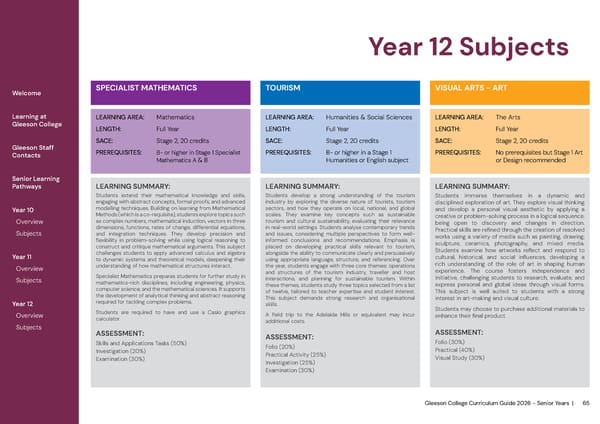Gleeson College Curriculum Guide 2026 - Senior Years | 65 Year 12 Subjects Welcome Learning at Gleeson College Gleeson Staff Contacts Senior Learning Pathways Year 10 Overview Subjects Year 11 Overview Subjects Year 12 Overview Subjects LEARNING SUMMARY: Students extend their mathematical knowledge and skills, engaging with abstract concepts, formal proofs, and advanced modelling techniques. Building on learning from Mathematical Methods (which is a co-requisite), students explore topics such as complex numbers, mathematical induction, vectors in three dimensions, functions, rates of change, differential equations, and integration techniques. They develop precision and flexibility in problem-solving while using logical reasoning to construct and critique mathematical arguments. This subject challenges students to apply advanced calculus and algebra to dynamic systems and theoretical models, deepening their understanding of how mathematical structures interact. Specialist Mathematics prepares students for further study in mathematics-rich disciplines, including engineering, physics, computer science, and the mathematical sciences. It supports the development of analytical thinking and abstract reasoning required for tackling complex problems. Students are required to have and use a Casio graphics calculator. ASSESSMENT: Skills and Applications Tasks (50%) Investigation (20%) Examination (30%) SPECIALIST MATHEMATICS LEARNING AREA: Mathematics LENGTH: Full Year SACE: Stage 2, 20 credits PREREQUISITES: B- or higher in Stage 1 Specialist Mathematics A & B TOURISM LEARNING AREA: Humanities & Social Sciences LENGTH: Full Year SACE: Stage 2, 20 credits PREREQUISITES: B- or higher in a Stage 1 Humanities or English subject LEARNING SUMMARY: Students develop a strong understanding of the tourism industry by exploring the diverse nature of tourists, tourism sectors, and how they operate on local, national, and global scales. They examine key concepts such as sustainable tourism and cultural sustainability, evaluating their relevance in real-world settings. Students analyse contemporary trends and issues, considering multiple perspectives to form well- informed conclusions and recommendations. Emphasis is placed on developing practical skills relevant to tourism, alongside the ability to communicate clearly and persuasively using appropriate language, structure, and referencing. Over the year, students engage with three core themes: operations and structures of the tourism industry, traveller and host interactions, and planning for sustainable tourism. Within these themes, students study three topics selected from a list of twelve, tailored to teacher expertise and student interest. This subject demands strong research and organisational skills. A field trip to the Adelaide Hills or equivalent may incur additional costs. ASSESSMENT: Folio (20%) Practical Activity (25%) Investigation (25%) Examination (30%) VISUAL ARTS - ART LEARNING AREA: The Arts LENGTH: Full Year SACE: Stage 2, 20 credits PREREQUISITES: No prerequisites but Stage 1 Art or Design recommended LEARNING SUMMARY: Students immerse themselves in a dynamic and disciplined exploration of art. They explore visual thinking and develop a personal visual aesthetic by applying a creative or problem-solving process in a logical sequence, being open to discovery and changes in direction. Practical skills are refined through the creation of resolved works using a variety of media such as painting, drawing, sculpture, ceramics, photography, and mixed media. Students examine how artworks reflect and respond to cultural, historical, and social influences, developing a rich understanding of the role of art in shaping human experience. The course fosters independence and initiative, challenging students to research, evaluate, and express personal and global ideas through visual forms. This subject is well suited to students with a strong interest in art-making and visual culture. Students may choose to purchase additional materials to enhance their final product. ASSESSMENT: Folio (30%) Practical (40%) Visual Study (30%)
 2026 Gleeson College Senior Years Curriculum Guide 2026 Page 64 Page 66
2026 Gleeson College Senior Years Curriculum Guide 2026 Page 64 Page 66